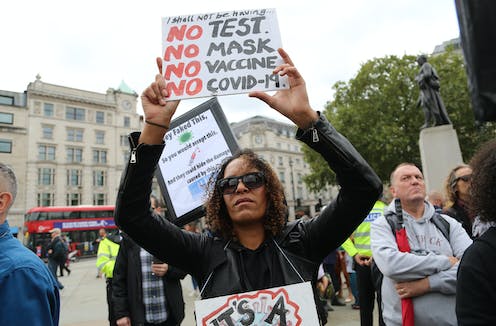
I T S/Shutterstock
Fear engulfed everyone during the pandemic. Yet when a vaccine became available, it was met with fierce resistance. Anti-vaccination crowds formed, and some of these groups argued this vaccine was against their religious beliefs.
Many didn’t trust the scientists and their explanation for how they said the disease spread. A lot of people didn’t believe the vaccine worked as well as governments claimed, or they felt mandatory vaccinations violated their personal freedom.
Misinformation also proliferated, sowing doubt about the safety of vaccines and accusing governments and scientists of sinister motives.
You may think I am referring to the COVID-19 pandemic. However, I am not. This eerily familiar scenario played out in the 19th century when smallpox was still raging across Europe.

University of Alberta
Anti-vaccination groups, as well as other anti-science movements, are not new phenomena, nor are the nature of their objections. Unfortunately, because history is usually ignored when dealing with current scientific issues, people fail to acknowledge that most anti-science arguments have been around for centuries.
The fact that we live in a misinformation era shows these anti-science movements are also quite effective. And they have had a deadly impact on our society. For example, researchers found that between January 2021 and April 2022, vaccinations could have prevented at least 318,000 COVID-19 deaths in the US.
Table of Contents
Questioning the experts
A good example of how history is being overlooked is the notion that people’s rejection of expertise is a new phenomenon. Yet, in 1925, a Tennessee high school teacher, John Scopes, went on trial for teaching the theory of evolution to his students, which (due to the recent Butler Act) was considered illegal.
What became known as the Scopes monkey trial started as a publicity stunt by the American Civil Liberties Union, which was itching to challenge the Tennessee state’s Butler Act. But it quickly turned into a face-off between an anti-evolutionist prosecutor and a defence team eager to debunk fundamentalist Christianity.
The trial ended with Scopes pleading guilty and handed a small fine. He is, however, still seen by many as a defender of science, likely because of the 1960 movie based on Scopes’ story.
The trial is important to science communication because of the rejection of expert witnesses. Seven out of eight experts were blocked from speaking (their testimonies were deemed irrelevant).

Joseph Sohm/Shutterstock
We saw a repeat of such rejection of expertise nearly a century later with COVID-19. Dr Anthony Fauci, the most prominent US government public health spokesperson during the pandemic, was often met with distrust by many members of the public, and was criticised by Donald Trump when he was president. Trump had paved the way for this by pronouncing that “experts are terrible” during his 2016 presidential campaign.)
Fauci was even falsely accused of funding research to develop the virus and of conspiring with Microsoft co-founder Bill Gates and the pharmaceutical industry to become rich from COVID vaccines. All this is likely to have affected how some people responded to Fauci’s crucial information during the pandemic.
Expertise, trustworthiness, and objectivity are the components that make up someone’s credibility. So when scientists are portrayed as biased, the effectiveness of their communication plummets.
Treating sceptics with disrespect achieves nothing
Most scientists get little (if any) communication training, which can leave them unprepared for online showdowns over contested science. Take the immunologist Roberto Burioni as an example. In 2016, he caused a row when he deleted all comments relating to a Facebook discussion about vaccination. Burioni added a highly insensitive post that read:
“Here only those who have studied can comment, not the common citizen. Science is not democratic.”
This post did attract some likes but also many death threats and alienated countless people.
Of course, the scale of the misinformation problem can feel overwhelming. And partly since some research suggests countering falsehoods can end up reinforcing them), experts often avoid these types of debates.
However, a growing body of work suggests correcting misinformation can be worthwhile and effective. The information needs to be tailored to the audience, though, because a standard explanation may not fit everyone.
A fork in the road
Many scientists have an aptitude for engaging the public. MIT-engineer and Emmy-nominated science TV host Emily Calandrelli and blow-gun-wielding neurobiologist Robert Sapolsky have captured the imaginations of millions of people with no background in science.
The late neurologist Oliver Sacks was known as the “poet laureate of medicine” for his work writing about poorly understood conditions such as Tourette’s syndrome and autism. There are science YouTube channels with tens of millions of subscribers and blogs that attract millions of views.
But the smallpox protests and the Scopes trial are not isolated historical events. History can help scientists reevaluate how they communicate, stop repeating mistakes, and form better relationships with the public.
![]()
Katrine K. Donois does not work for, consult, own shares in or receive funding from any company or organisation that would benefit from this article, and has disclosed no relevant affiliations beyond their academic appointment.
























